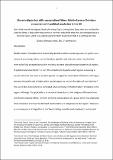Files in this item
Shared religion but still a marginalized Other : Middle Eastern Christians' encounters with political secularism in the United Kingdom
Item metadata
| dc.contributor.author | McCallum, Fiona | |
| dc.date.accessioned | 2020-04-15T23:32:02Z | |
| dc.date.available | 2020-04-15T23:32:02Z | |
| dc.date.issued | 2018-04-16 | |
| dc.identifier | 252360258 | |
| dc.identifier | 3049f8df-e0e9-4479-af7e-19737b9adedd | |
| dc.identifier | 85070849464 | |
| dc.identifier | 000492871700004 | |
| dc.identifier.citation | McCallum , F 2018 , ' Shared religion but still a marginalized Other : Middle Eastern Christians' encounters with political secularism in the United Kingdom ' , Journal of Church and State , vol. 61 , no. 2 , csy006 , pp. 242-261 . https://doi.org/10.1093/jcs/csy006 | en |
| dc.identifier.issn | 0021-969X | |
| dc.identifier.other | ORCID: /0000-0001-9729-4794/work/60196741 | |
| dc.identifier.uri | https://hdl.handle.net/10023/19806 | |
| dc.description.abstract | This paper explores the negotiation of political secularism by a migrant group who have a shared religious heritage with the majority population in their new country but are identified as a minority Other due to their ethnic and national origins. Middle Eastern Christians like other religious minorities in the Middle East, have tended to favour “secular values” in politics as a means of attempting to acquire equal rights as citizens and limiting the public role of Islam. The UK can be seen as providing new opportunities for Middle Eastern Christians given its Christian heritage and support for religious tolerance and equality. For many of these migrants, there were multiple reasons for leaving the Middle East including economic, societal, family and religious factors. The paper argues that assumptions of shared Christian identity as a basis of practising belonging to their new state has not enabled them to becoming part of the majority. Instead, political secularism has led to a situation where they consider that they are still a marginalised ‘Other’ due to their ethnic/national background. Furthermore, community members highlight the lack of privileges given to the dominant religion and the perceived challenges they face in practising Christianity. This paper locates the case study in a discussion on secularism, church-state relations and migration before presenting the narratives of encounters with political secularism. These are: perspectives on the idea of Britain as a Christian country; the impact on political and societal interactions and the implications for younger generations. Based on qualitative research with Egyptian, Iraqi and Assyrian Christians residing in the UK, the paper argues that direct and indirect experiences in the Middle Eastern homelands directly affect understandings and reactions to political secularism in the UK. | |
| dc.format.extent | 410659 | |
| dc.language.iso | eng | |
| dc.relation.ispartof | Journal of Church and State | en |
| dc.subject | BL Religion | en |
| dc.subject | BR Christianity | en |
| dc.subject | T-NDAS | en |
| dc.subject | BDC | en |
| dc.subject | R2C | en |
| dc.subject | SDG 10 - Reduced Inequalities | en |
| dc.subject | MCP | en |
| dc.subject.lcc | BL | en |
| dc.subject.lcc | BR | en |
| dc.title | Shared religion but still a marginalized Other : Middle Eastern Christians' encounters with political secularism in the United Kingdom | en |
| dc.type | Journal article | en |
| dc.contributor.institution | University of St Andrews. School of International Relations | en |
| dc.contributor.institution | University of St Andrews. Centre for Minorities Research (CMR) | en |
| dc.identifier.doi | 10.1093/jcs/csy006 | |
| dc.description.status | Peer reviewed | en |
| dc.date.embargoedUntil | 2020-04-16 |
This item appears in the following Collection(s)
Items in the St Andrews Research Repository are protected by copyright, with all rights reserved, unless otherwise indicated.

